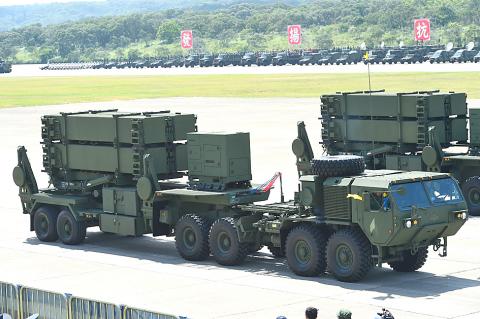A Taiwanese manufacturer has become part of the US-made MIM-104F (PAC-3) Patriot missile supply chain after passing appraisals from the weapon’s developer, sources said, adding that the company has received NT$800 million (US$25.3 million) in international orders.
“Although the PAC-3 missile is an American product, it has Taiwanese technology in its ‘DNA,’” said a high-ranking military official who declined to be named, adding that the local manufacturer has exceptionally good radar-tracking signal management technology that the US contractors wanted.
The radar signal management technology was developed at the Ministry of National Defense-affiliated National Chungshan Institute of Science and Technology and started out as a military product before being released for commercial use, the official said.

Photo: Chang Chia-ming, Taipei Times
The high-speed digital signal management software module was released to a large domestic software company, which then used it in domestic and international military equipment orders, the official said, adding that these orders included the PAC-3 after it passed appraisals by US-based companies Lockheed Martin and Raytheon.
The official said the high-speed software is essential to interception and defense capabilities, adding that the Taiwanese software not only received recognition from foreign firms, but is also used in the Tien Kung III (Sky Bow III) surface-to-air missile system.
Institute vice director Major General Chang Kuan-chun (張冠群) led the institute’s first delegation to an international aerospace exhibition in Japan from Wednesday last week through Saturday.
The delegation exhibited 34 domestically developed defense technology products, including the Tien Kung III, Hsiung Feng II and Hsiung Feng III anti-ship missiles, and medium and large-sized automated drone systems.
The institute said it aims to improve international recognition of Taiwanese defense technology and improve cooperation with international manufacturers in producing both civilian and military products.
The missile system’s technology can be combined with other weapons and communications systems according to customer requirements, the institute said, adding that Taiwanese manufacturers are able to make complete aerospace systems.
Taiwan, South Korea and Japan deploy PAC-3 missile defense systems, the official said, adding that the institute was approached about the design and capabilities of the technology many times over the course of the exhibition.

‘FORM OF PROTEST’: The German Institute Taipei said it was ‘shocked’ to see Nazi symbolism used in connection with political aims as it condemned the incident Sung Chien-liang (宋建樑), who led efforts to recall Democratic Progressive Party (DPP) Legislator Lee Kun-cheng (李坤城), was released on bail of NT$80,000 yesterday amid an outcry over a Nazi armband he wore to questioning the night before. Sung arrived at the New Taipei City District Prosecutors’ Office for questioning in a recall petition forgery case on Tuesday night wearing a red armband bearing a swastika, carrying a copy of Adolf Hitler’s Mein Kampf and giving a Nazi salute. Sung left the building at 1:15am without the armband and apparently covering the book with a coat. This is a serious international scandal and Chinese

PERSONAL DATA: The implicated KMT members allegedly compiled their petitions by copying names from party lists without the consent of the people concerned Judicial authorities searched six locations yesterday and questioned six people, including one elderly Chinese Nationalist Party (KMT) member and five KMT Youth League associates, about alleged signature forgery and fraud relating to their recall efforts against two Democratic Progressive Party (DPP) legislators. After launching a probe into alleged signature forgery and related fraud in the KMT’s recall effort, prosecutors received a number of complaints, including about one petition that had 1,748 signatures of voters whose family members said they had already passed away, and also voters who said they did not approve the use of their name, Taipei Deputy Chief Prosecutor

UNDER ATTACK: Raymond Greene said there were 412 billion malicious threats in the Asia-Pacific region in the first half of 2023, with 55 percent targeting Taiwan Taiwan not only faces military intimidation from China, but is also on the front line of global cybersecurity threats, and it is taking action to counter those attacks, President William Lai (賴清德) said yesterday. Speaking at the opening of this year’s Cybersec Expo in Taipei, the president assured foreign diplomats and exhibitors that Taiwan remained committed to strengthening its defense against cyberattacks and enhancing the resilience of its digital infrastructure. Lai referenced a report from the National Security Bureau (NSB) indicating that the Government Service Network faced an average of 2.4 million intrusion attempts daily last year, more than double the figure

Retired US general Robert B. Abrams reportedly served as adviser to Chief of the General Staff Admiral Mei Chia-shu (梅家樹) during the Ministry of National Defense’s computer-simulated war games in the buildup to this year’s 41st annual Han Kuang military exercises, local media reported yesterday. For 14 days and 13 nights starting on April 5 and ending yesterday, the armed forces conducted the computer-simulated war games component of the Han Kuang exercises, utilizing the joint theater-level simulation system (JTLS). Using the JTLS, the exercise simulated a continuous 24-hour confrontation based on scenarios such as “gray zone” incursions and the Chinese People’s Liberation